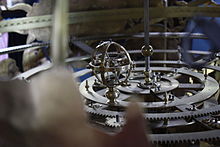The Conservative Lie About Moral Relativity
Periodically leftists get blamed for creating a moral relativism that is destroying society. Here’s one Marcy caught:
Maybe we landed on the moon, maybe not. Maybe the moon is made of cheese. Different people say different things. Who can really say? https://t.co/BK9wM5U6OL
— Patrick Chovanec (@prchovanec) November 24, 2019
Two takeaways:
1) The Right has fully embraced the post-modern relativism it long criticized.
2) To my friends on the Left: the abolition of “objective truth” only appeared to favor the marginalized; in fact, it favors the powerful, emancipating them from any need to justify.
— Patrick Chovanec (@prchovanec) November 24, 2019
If truth is ultimately subjective, there is no reason I should not simply impose my truth on you, if I am more powerful.
— Patrick Chovanec (@prchovanec) November 24, 2019
And here’s a piece from Dan Dreezner, tongue-in-cheek, but still:
Traditionally, commentators have tended to assume that those articulating “there are no facts, just opinion” views came from the left. No longer!
Well, those commentators can just fuck right off.
1. Patrick Chovanec seems to think the dominant class never thought of using its position to control the definition of facts, and to write history to show that they deserve to be dominant until philosophers and then leftists started talking about the nature of truth. [1] Rightists say the left is responsible for the decline of morality for pointing out that the dominant class are self-serving liars and haters.
Political conservatives deflect with harpy shrieks that the left denies the existence of all facts and history. No. Leftists deny the fabrications of the dominant class. Lefties reject the facts that the tobacco industry created denying that cigarettes cause lung cancer. Lefties deny the manufactured facts about climate change spread by the fossil fuel industry. Why, some lefties even deny the truth of Parson Weems’ stories about George Washington.
There have always been people who contested the facts asserted by the dominant class; for example, Galileo. The Catholic Church made him deny his own factual observations on the ground that he must be wrong because he contradicted their interpretation of the Bible. That contradicted the claim of the church hierarchy that it possessed the sole power to interpret scripture. This is mirrored by the decision of Catholic prelates to handle child rapist priests in-house rather than through the justice system.
The right wing thinks academics are leftists. These scholars are writing histories that recover and include the voices of working people in the labor movement and other dissidents who are canceled by the dominant class in their histories. [2] Making new factual observations and finding old records to incorporate into histories is the exact opposite of denying the existence of facts and histories.
2. In this post I take up a not so post-modern view of facts and truth, that espoused by Charles Sanders Peirce and Henry James. Truth is a property of our beliefs: do they correspond with reality in ways that are useful for some human purpose. Peirce and James and other pragmatists do not deny that there are facts. They know that things exist in the world, separate from individual human beings. But they deny the existence of non-corporeal things that only a few people can perceive. They reject the Platonic idea of the “forms” external to the reality we can experience directly or indirectly. They say that what we can sense is all there is for us of that external reality. [3]
Those who take the other view insist that there are absolutes like the Platonic Ideal Chair of which the chair I’m sitting in is merely an exemplar. But that’s just pretend. What they mean is that there is an external source for absolute morality. In the US, most of them mean that their Christian Bible establishes absolute morality, and anyone who questions that is wrecking society.
A lesser person that I am might point out that it’s a strange religion that teaches that character is the only important factor in voting for president, so adherents must not vote for any Clinton; but also teaches that a different adulterer and liar who is also a corrupt businessman is an instrument of the Almighty, and that it’s sinful to believe otherwise.
I’ll just say I can’t understand why anyone would pay attention so someone claiming that they are receiving directions from the Almighty, directions no one else can perceive. [3] For example, when people tell us they killed their children because God told them to, we consider them criminal or insane. Why is it different when similar people abuse our LGBTQ brothers and sisters because God told them to? [4] Why should they be allowed to enact laws to enshrine their hate-filled views like the laws that wrecked the life of the genius Alan Turing? So, yes. Some lefties and lots of other people really do reject the idea of absolute morals.
3. Conservatives are convinced that if there is no source for absolute morals, no God, then everything is permitted, as Dostoevsky puts it in The Brothers Karamazov. This is a shocking proposition. It implies that people will only act morally if there is some form of punishment or reward. But that is not the way we live. We are all raised to understand our obligations and responsibilities in our families, in our schools and in society at large. We know the rules, and we know why we have those rules. This is true of Pakistani Muslims, Israeli Ultra-Orthodox Jews, Indian Hindus, Chinese Confucianists, US atheists, and Bolivian Catholics, Native Americans, in fact, in avery society ever. There are customs, mores, rules of etiquette, rules about food, hierarchies of respect, funerary customs, laws, and institutions to teach and enforce all of these and more.
This is from an essay by Richard Rorty titled Moral Relativism, 1996.
In his more recent book Thick and Thin, [Michael] Walzer argues that we should not think of the customs and institutions of particular societies as accidental accretions around a common core of universal moral rationality, the transcultural moral law. Rather, we should think of the thick set of customs and institutions as prior, and as what commands moral allegiance. The thin morality which can be abstracted out of the various thick moralities is not made up of the commandments of a universally shared human faculty called ‘reason’. Such thin resemblances between these thick moralities as may exist are contingent, as contingent as the resemblances between the adaptive organs of diverse biological species. [5]
In other words, we can’t reason our way to an absolute morality, any more than we can have it handed to us by people claiming they know the will of the Ineffable. We inherit a morality by osmosis and direct teaching, and we inherit ways of judging our actions based on that morality. That suffices for many. But we can learn about other cultures and their moralities, and we can make value judgments about both our own and other cultures. Further, we are able to question our own standards for judging moralities. As Rorty puts it,
The pragmatist view of what opponents of pragmatism call ‘firm moral principles’ is that such principles are abbreviations of past practices – ways of summing up the habits of the ancestors we most admire. P. xxix.
I don’t admire those of my ancestors who thought that enslaved people are not human beings, or that Jews are cursed, or that women are chattel or that the LGBTQ community is an abomination. I admire my ancestors who fought against those firm moral principles, trying to wreck the morality taught by the then dominant class.
=====
[1] I discuss this use of power to create a kind of reality here, with links to other aspects of Pierre Bourdieu’s ideas. Of course, my citation to a French scholar makes me utterly irrelevant.
[2] For example, Howard Zinn’s A People’s History of the US and Ibram X. Kendi’s Stamped From the Beginning, both of which I highly recommend.
[3] For a different view, see Thomas Merton’s book Mystics and Zen Masters.
[4] I urge readers to consider Kierkegaard’s Fear And Trembling carefully. And maybe watch the excellent 1991 movie The Rapture.
[5] Philosophy and Social Hope, p. viii, at xxxi; it’s aimed at lay readers, and is very accessible. On the subject of what Walzer calls transcultural moral law, see Karen Armstrong’s book, The Great Transformation. I liked this book, but reviewers are less favorable. Roughly, Armstrong discusses the idea of The Axial Age, put forward by Karl Jaspers, noting similar reactions across cultures to the dislocations of the period 1000-200 BCE.


